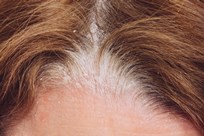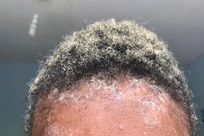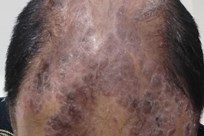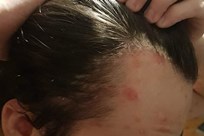Scalp Psoriasis
Scalp psoriasis can make the scalp feel itchy and tight, and cause dandruff-like flakes to fall.
About scalp psoriasis
It is very common for
plaque psoriasis to occur on the scalp. It usually looks similar to plaque
psoriasis on other areas of the body, but can be prone to quite a thick
build-up of scaly skin, which may cause dandruff-like flakes to fall. Scalp
psoriasis may also be visible around the hairline, on the forehead, neck and
behind the ears. It can make the scalp feel itchy and tight. In severe cases,
the thickness of the scale can cause thinning of the hair, but usually this is
temporary and goes back to normal with effective treatment of the psoriasis.
How is scalp psoriasis treated?
Some shampoo
treatments can be bought over the counter, however, if your scalp is covered
with thick scale or doesn’t clear up, do consult your GP. There is a wide range
of topical treatments that can be
prescribed including coal tar, dithranol, salicylic acid, steroid creams and
ointments, Vitamin D based treatments, as well as
oils for moisturising the scalp, such as coconut oil. Various scalp treatments are available in cream, ointment,
mousse, gel or shampoo formulations. If your scalp psoriasis is particularly difficult to treat, your
GP may refer you to a Dermatologist, Dermatology Nurse Specialist, or GP with a
special interest in skin.
Applying the treatment
It is important to get the method of applying scalp treatment right – the treatment needs to be on the scalp rather than on the hair. It might be best to part the hair in sections and apply the treatment on the exposed areas of scalp. You may need someone to help you to reach the top and back of your head properly. You will find that some treatments need to be left on and some need to be washed out after a set period of time. Do follow the instructions that come with the product or the advice of your doctor, nurse or pharmacist.
Can I brush and comb my hair?
It is normal to want to comb or brush hair, and it can actually be helpful to remove loose scales. Just take care not to scratch the scalp.
What about perms and other hair treatments?
Scalp psoriasis does not necessarily mean you can’t have hair treatments, but you do need to be careful. Certain things that do not touch the scalp – such as highlights – should be fine, and treatments that do touch the scalp (such as perms and dyes) usually require a ‘patch test’ to be done in advance, to make sure you do not have a reaction. If there is broken skin on the scalp then it is not advisable to have dyes or perms applied. It is always a good idea to discuss your scalp psoriasis with your hairdresser, who should have up to date information about possible options, and if in doubt always consult your doctor.
I am embarrassed to go to the hairdresser
A good hairdresser should have been trained in various scalp conditions, and should be able to help you manage your hair. Telephone in advance and speak to a stylist to explain the situation or try to find a hairdresser who will visit you at home.
My hair is coming out!
Some people with severe scalp psoriasis see temporary thinning of the hair. This is often because of a build-up of scale, or from scratching.
Does it go away?
Psoriasis tends to come and go. After treating their scalp psoriasis, some people may be lucky enough not to have a further flare up, and others may have periods of no scalp psoriasis followed by a flare up where it comes back again.



